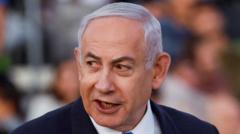Benjamin Netanyahu, the Israeli Prime Minister, may encounter arrest in the UK after the ICC issued a warrant against him and Israel's former defense minister for alleged war crimes. The UK government's response underscores a tension between legal obligations and the need to maintain diplomatic ties with Israel amid rising controversy over the ICC's authority.
Netanyahu's Arrest Warrant by ICC Raises Legal and Political Dilemmas for UK

Netanyahu's Arrest Warrant by ICC Raises Legal and Political Dilemmas for UK
As Israel's Prime Minister faces an arrest warrant from the International Criminal Court, the UK government navigates potential legal obligations and diplomatic relations.
Article Text:
On Thursday, Israeli Prime Minister Benjamin Netanyahu became a figure of significant international scrutiny as the International Criminal Court (ICC) issued an arrest warrant against him and former defense minister Yoav Gallant due to alleged war crimes associated with the ongoing conflict in Gaza. Following this announcement, Downing Street communicated that Netanyahu could face arrest if he enters the UK, although a spokesman declined to comment on specific hypotheticals related to his case.
The ICC's warrant holds considerable implications for member states, including the UK, which are legally obligated to act on such warrants under the terms of the ICC Act 2001. This act specifies that when a warrant is issued by the ICC, an appropriate judicial officer must review its legitimacy and respond accordingly. Officials at Downing Street have insisted that the UK will uphold its legal commitments, with one spokesman affirming the government's intention to adhere to both domestic laws and international legal responsibilities.
Questions remain about the practicalities of fulfilling this legal obligation, including which minister may be involved and whether legal assistance from Attorney General Lord Hermer is being sought. While the government remains focused on its ongoing dialogue with Israel, emphasizing the nation's status as a crucial partner across various sectors, the situation raises significant diplomatic concerns.
The implications of the arrest warrants may depend largely on the willingness of ICC member states, which do not include either Israel or the United States, to enforce them. US President Joe Biden expressed strong opposition to the warrant, labeling it "outrageous" and asserting that no moral equivalence exists between the actions of Israel and Hamas. Conversely, several European officials have indicated their commitment to the ICC's rulings, presenting a divergence in international attitudes toward the warrants.
In a parallel development, the ICC has issued a warrant for Hamas military commander Mohammed Deif in connection with the attacks against Israel on October 7th,although Hamas has not publicly addressed that warrant. The dual issuance of warrants has led to a heated debate regarding the interpretation of international law and the ICC's role in contemporary conflicts.
Critics within the UK, such as Shadow Foreign Secretary Dame Priti Patel, have condemned the ICC's actions and suggested that they create a false equivalence between Israel's military operations in Gaza and acts of aggression by Hamas. Despite the heated discourse surrounding these warrants, the newly-elected Labour government has decided not to challenge the ICC's authority, recognizing the complex legal framework in which it operates.
As the international community closely watches the developments, it remains to be seen how the UK government will balance its legal obligations with strategic diplomatic relations and the ongoing humanitarian crisis in Gaza.
On Thursday, Israeli Prime Minister Benjamin Netanyahu became a figure of significant international scrutiny as the International Criminal Court (ICC) issued an arrest warrant against him and former defense minister Yoav Gallant due to alleged war crimes associated with the ongoing conflict in Gaza. Following this announcement, Downing Street communicated that Netanyahu could face arrest if he enters the UK, although a spokesman declined to comment on specific hypotheticals related to his case.
The ICC's warrant holds considerable implications for member states, including the UK, which are legally obligated to act on such warrants under the terms of the ICC Act 2001. This act specifies that when a warrant is issued by the ICC, an appropriate judicial officer must review its legitimacy and respond accordingly. Officials at Downing Street have insisted that the UK will uphold its legal commitments, with one spokesman affirming the government's intention to adhere to both domestic laws and international legal responsibilities.
Questions remain about the practicalities of fulfilling this legal obligation, including which minister may be involved and whether legal assistance from Attorney General Lord Hermer is being sought. While the government remains focused on its ongoing dialogue with Israel, emphasizing the nation's status as a crucial partner across various sectors, the situation raises significant diplomatic concerns.
The implications of the arrest warrants may depend largely on the willingness of ICC member states, which do not include either Israel or the United States, to enforce them. US President Joe Biden expressed strong opposition to the warrant, labeling it "outrageous" and asserting that no moral equivalence exists between the actions of Israel and Hamas. Conversely, several European officials have indicated their commitment to the ICC's rulings, presenting a divergence in international attitudes toward the warrants.
In a parallel development, the ICC has issued a warrant for Hamas military commander Mohammed Deif in connection with the attacks against Israel on October 7th,although Hamas has not publicly addressed that warrant. The dual issuance of warrants has led to a heated debate regarding the interpretation of international law and the ICC's role in contemporary conflicts.
Critics within the UK, such as Shadow Foreign Secretary Dame Priti Patel, have condemned the ICC's actions and suggested that they create a false equivalence between Israel's military operations in Gaza and acts of aggression by Hamas. Despite the heated discourse surrounding these warrants, the newly-elected Labour government has decided not to challenge the ICC's authority, recognizing the complex legal framework in which it operates.
As the international community closely watches the developments, it remains to be seen how the UK government will balance its legal obligations with strategic diplomatic relations and the ongoing humanitarian crisis in Gaza.

















